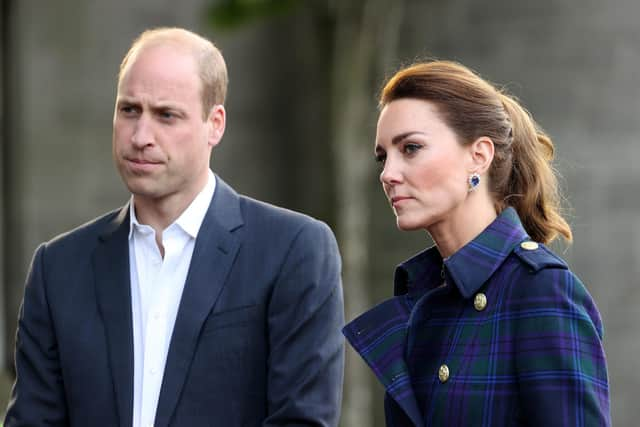Prince William and Kate 'to spend more time in Scotland' under plans to boost support for the Union
and live on Freeview channel 276
Let us know what you think and join the conversation at the bottom of this article.
Kate and William would spend more time at Balmoral and strengthen ties with their former university town of St Andrews if the proposals go ahead, according to the Sunday Times.
The report comes just days after the couple’s tour of Scotland in which William said the country was “so important” to himself and wife.


Advertisement
Hide AdAdvertisement
Hide AdOn the final day of their visit, William and Kate - known as the Earl and Countess of Strathearn when in Scotland - held a meeting with Gordon Brown who has recently launched a renewed campaign to save the Union.
The couple sat down for talks with the former prime minister and his wife Sarah at the Queen’s official Edinburgh residence.
William later gave a highly personal farewell speech as his week-long tour drew to a close, describing how Scotland has “shaped” him and praising its people and values.
The argument over Scottish independence has intensified after the Scottish National Party’s landslide victory in the Holyrood election in May, which also produced the largest pro-independence majority in the Parliament in the history of devolution.
Advertisement
Hide AdAdvertisement
Hide AdBoris Johnson has since stood by his pre-election position, saying the focus should be on the recovery from Covid-19 and not on another independence referendum.
Last month, a spokesperson for Kensington Palace said: “During his time in Scotland Prince William has spoken to a broad range of people from different communities including politicians from across the political spectrum.”
The duke sat down for talks with First Minister Nicola Sturgeon and also met Alistair Carmichael, Liberal Democrat MP for Orkney and Shetland.
Soon after the Holyrood election Mr Brown announced his Our Scottish Future think tank which will become a “campaigning movement” seeking to appeal to “middle Scotland”, those who are not entrenched in their positions on the union or independence.
Advertisement
Hide AdAdvertisement
Hide AdMr Brown, who played a key role in the No campaign during the 2014 vote, has said those in middle Scotland are “patriots not nationalists” who want to see greater cooperation between the UK’s governments.
Ahead of the Scottish independence referendum in 2014 the Queen reportedly said she hoped voters would “think very carefully about the future”.
Before the Queen’s reported comment Buckingham Palace had issued a statement, following speculation she was growing increasingly concerned about Scotland breaking away, saying any suggestion the monarch would wish to influence the outcome of the referendum was “categorically wrong”.
Speaking in Edinburgh at the closing ceremony of the General Assembly of the Church of Scotland, William said about some of the memorable individuals he had met: “These people make Scotland the vibrant, friendly, innovative and determined place Catherine and I love, and is so important to us.”
Advertisement
Hide AdAdvertisement
Hide AdThe duke who is the assembly’s Lord High Commissioner added: “I’m shaped by this place.
“The abiding affection I feel for it is rooted in my experience of its everyday life in people, relationships, and its ethic of neighbourliness.”
A message from the Editor:
Thank you for reading this article. We're more reliant on your support than ever as the shift in consumer habits brought about by coronavirus impacts our advertisers.
If you haven't already, please consider supporting our trusted, fact-checked journalism by taking out a digital subscription.
Comment Guidelines
National World encourages reader discussion on our stories. User feedback, insights and back-and-forth exchanges add a rich layer of context to reporting. Please review our Community Guidelines before commenting.
